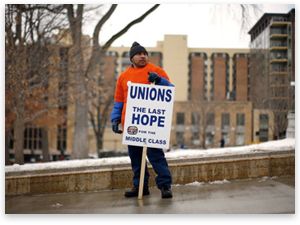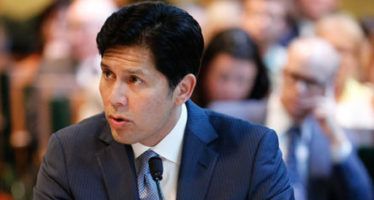Economist on Government Unions
Economist Thomas DiLorenzo, who recently testified in Congress before Ron Paul’s subcommittee on monetary policy, has a great new article on public-employee unions. He writes:
The main reason why so many state and local governments are bankrupt, or on the verge of bankruptcy, is the combination of government-run monopolies and government-employee unions. Government-employee unions have vastly more power than do private-sector unions because the entities they work for are typically monopolies.
When the employees of a grocery store, for example, go on strike and shut down the store, consumers can simply shop elsewhere, and the grocery-store management is perfectly free to hire replacement workers. In contrast, when a city teachers’ or garbage-truck drivers’ union goes on strike, there is no school and no garbage collection as long as the strike goes on. In addition, teachers’ tenure (typically after two or three years in government schools) and civil-service regulations make it extremely costly if not virtually impossible to hire replacement workers….
Thirty years ago, the economist Sharon Smith was publishing research showing that government employees were paid as much as 40 percent more than comparable private-sector employees. If anything, that wage premium has likely increased.
The enormous power of government-employee unions effectively transfers the power to tax from voters to the unions. Because government-employee unions can so easily force elected officials to raise taxes to meet their “demands,” it is they, not the voters, who control the rate of taxation within a political jurisdiction.
He writes that politicians long have mollified union demands by pushing the cost into the future through expanding pension promises. But now:
As taxpayers in California, Wisconsin, Indiana, and many other states are realizing, the future has arrived. The Wall Street Journal reports that state and local governments in the United States currently have $3.5 trillion in unfunded pension liabilities. They must either raise taxes dramatically to fund these liabilities, as some have already done, or drastically cut back or eliminate government-employee pensions….
This charade is over. American taxpayers finally seem to be aware that they are the servants, not the masters, of government at all levels. Government-employee unions have played a key role in causing bankruptcy in most American states, and their pleas for more bailouts financed by endless tax increases are finally ringing hollow.
‘Bout time.
Read DiLorenzo’s full article here.
Feb. 24, 2011
Related Articles
Special interest union bill may die in Assembly
May 29, 2013 By Katy Grimes Occasionally the Legislature gets it right and kills a bad bill. Today may be
Government: Inefficient and inhumane
Nov. 30, 2012 By Steven Greenhut Advocates for bigger government — just about everyone these days — seem to believe
Texas offers CA a road map in challenging Washington
President Trump’s signing of executive orders Wednesday to begin planning for construction of a wall along the Mexican border, to




